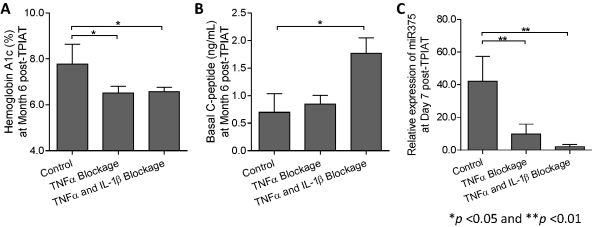Beneficial Effects of Controlling Peritransplant Inflammation in Total Pancreatectomy With Islet Autotransplantation: A Single Center Experience With Large Cohort of Patients
1Islet Cell Laboratory, Baylor Research Institute, Dallas, TX
2Institute for Biomedical Studies, Baylor University, Waco, TX
3Baylor Annette C. and Harold C. Simmons Transplant Institute, Dallas, TX.
Meeting: 2015 American Transplant Congress
Abstract number: 2
Keywords: Islets, Pancreatitis
Session Information
Session Time: 8:30am-9:45am
 Presentation Time: 8:45am-9:00am
Presentation Time: 8:45am-9:00am
Location: Terrace Ballroom 1, 2, 3
Background: Total pancreatectomy with islet autotransplantation (TPIAT) is an effective surgical treatment for patients with intractable chronic pancreatitis (CP). We recently reported that significant mass of transplanted islets were lost due to inflammatory reaction immediately after the islet infusion; however, the treatment to prevent such early graft loss in TPIAT has not been established yet.
Methods: TPIAT patients were given antiinflammatory treatment for TNFα blockage alone (etanercept), both TNFα and IL-1β (etanercept and anakinra: double blockage) or no medication (control) for 7 days post-TPIAT. Post-transplant islet function was monitored by serum C-peptide and hemoglobin A1c (HbA1c). Islet damage was assessed by measuring circulating micro RNA-375 (miR-375) levels with quantitative PCR.
Results: A total of 100 CP patients have undergone TPIAT since 2006 at our institute and 90 have been followed up over 6 months. The patients were treated with none, single or double blockage of inflammation (n=9, 32 or 49, respectively). Average HbA1c at six-month post-TPIAT in single and double blockage groups were significantly lower than control (6.5 ± 1.2 and 6.6 ± 1.1 versus 7.8 ± 1.7%; p <0.05; Fig A). Mean fasting C-peptide in double blockage group was significantly higher than control (1.8 ± 1.4 versus 0.7 ± 0.7 ng/mL; p =0.049; Fig B), whereas no significance was observed with single blockage group. Double blockage group showed significantly higher miR375 levels than control on day 7 (2.1 ± 1.3 and 42.1 ± 15.4 in relative expression values corrected with miR-423; p =0.002; Fig C).

Conclusions: Controlling inflammation during peritransplant period can enhance benefit of TPIAT by minimizing islet graft damage and improving glycemic control.
To cite this abstract in AMA style:
Takita M, Kanak M, Shahbazov R, Yoshimatsu G, Lawrence M, Dabous A, Kim P, Onaca N, Naziruddin B, Levy M. Beneficial Effects of Controlling Peritransplant Inflammation in Total Pancreatectomy With Islet Autotransplantation: A Single Center Experience With Large Cohort of Patients [abstract]. Am J Transplant. 2015; 15 (suppl 3). https://atcmeetingabstracts.com/abstract/beneficial-effects-of-controlling-peritransplant-inflammation-in-total-pancreatectomy-with-islet-autotransplantation-a-single-center-experience-with-large-cohort-of-patients/. Accessed February 17, 2026.« Back to 2015 American Transplant Congress
